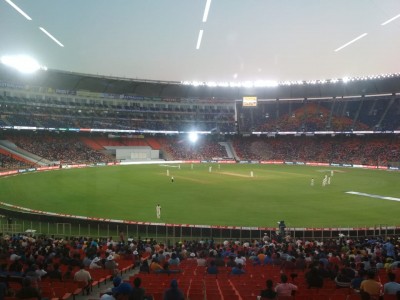By Khurram Habib
Ahmedabad, Feb 24 : India openers were on Wednesday presented with the trickiest phase of a pink ball Test, a brand new ball in the twilight period to begin their innings against two of England’s finest exponents of swing bowling – James Anderson and Stuart Broad – in the third match.
None of the two, neither Rohit Sharma nor Shubman Gill, had faced the pink ball in twilight phase. Gill is playing his first day-night Test and Rohit Sharma has played one before but did not bat in the twilight period.
The two managed to stave off the two opening bowlers and a couple of 30 second to minute-long blackouts when lights went off with Gill surviving close chances — a chance in second slip that was spilled and a close leg-before decision that went his way due to umpire’s call.
But as Rohit Sharma had said before the start of the Test, that the twilight session is “a little challenging, the weather and light suddenly change” and that “you have to be extra cautious and focused”, the duo stuck to the task of seeing off the new ball. That was before the introduction of express fast bowler Jofra Archer and left-arm spinner Jack Leach brought them wickets — Gill falling to a short ball and Pujara falling leg-before after missing the line.
Part of the reason why the two managed to do well was also because of the length the England bowlers kept. With little or no seam movement on offer and there being no wind at all to assist swing, the two pacers avoided fuller lengths with Anderson bowling back of length more frequently.
The strategy helped in controlling the run rate but it didn’t bring any success immediately.
The Indians negotiated that well with a frustrated Ben Stokes forgetfully applying saliva on the ball during the 12th over and being warned for it.
The shine on the pink ball lasts a bit longer than that on the red ball and that is why it is more important to ensure that the teams see off 5-10 overs more than they would against red ball.
The Motera wicket on which the grass has been shaved off doesn’t appear to be as kind to the new ball as a wicket with some amount of grass would be. The ball is likely to get scuffed up more quickly here.
It did lose its effectiveness after a while, making things easier for the batsmen. From 34/2 in 16 overs, India more than doubled their score to 72 after the end of the 23rd over.
It was also helped because England’s fifth bowler, Stokes, came on and proved a bit expensive but bringing him on as early as the 21st over was a victory in itself for the Indian batsman.
Disclaimer: This story is auto-generated from IANS service.

